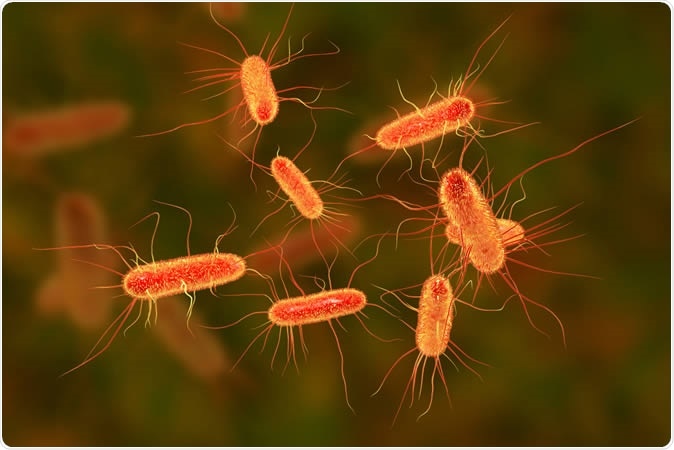The Centers for Disease Control and Prevention (CDC) is looking at a Shiga toxin-producing Escherichia coli outbreak that has spilled across state borders to affect people living in at least five states.

Escherichia coli bacterium, E.coli, gram-negative rod-shaped bacteria, part of intestinal normal flora and causative agent of diarrhea and inflammations of different location, 3D illustration - Illustration. Image Credit: Kateryna Kon / Shutterstock
The infections have been reported from Georgia, Kentucky, Ohio, Tennessee and Virginia. The outbreak started on the 2nd of March this year and till date has affected 72 individuals with eight hospitalizations says the CDC. Kentucky among the states, leads in the number of cases with 36 reported infections and next in line is Tennessee with 21 reported cases. Other states include 8 in Georgia, 5 in Ohia and 2 in Virginia.
Escherichia coli or E. coli is usually spread via contaminated food and water and through contact with infected animals and humans. Most of the strains of E coli are harmless with mild diarrheal illness. Some of the strains however can be dangerous leading to diarrhea, pneumonia and respiratory problems and other illnesses. People infected with Shiga toxin-producing E. coli or STEC or O103 strain can get severely ill.
The symptoms may start from one to 10 days after exposure to contaminated food or water. There may be diarrhea, high fever, blood in stool and vomiting. Continued diarrhea and vomiting can lead to dehydration and can also cause acute damage to the kidney leading to a kidney failure. A specific type of kidney failure can develop in persons infected with STEC called hemolytic uremic syndrome (HUS).
This investigation is being jointly done by the CDC, the U.S. Department of Agriculture’s Food Safety and Inspection Service and the U.S. Food and Drug Administration. The team have found that the spread of the infection is not associated with any specific food item or chain of grocery stores or restaurants. No particular foods or items have been blamed and the CDC has not asked people to avoid any food item as of now.
The report states that the infections have affected persons aged between 1 and 74 years with median age being 17 years. As of now no deaths or HUS cases have been reported with STEC cases said the CDC last Friday in its announcement. State and local health officials are interviewing all ill persons and their contacts to ascertain the source of the infection. There have been 18 such outbreaks in the US since 2000, say experts.
Experts have advised people to cook foods thoroughly and wash all fruits, vegetables and raw foods. They recommend use of only pasteurized juices and dairy products. Hand washing before eating and preparation of food and after using the toilet has also been emphasized upon.